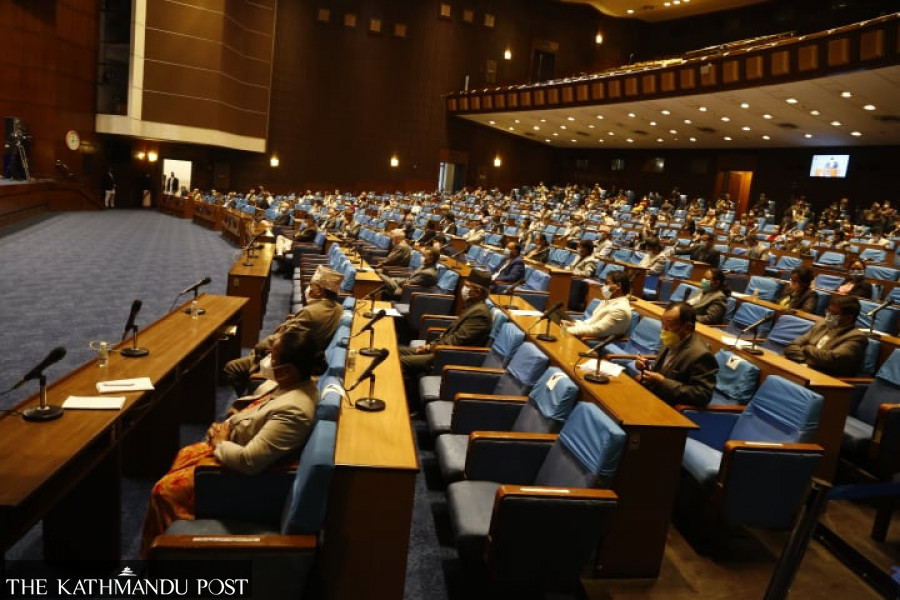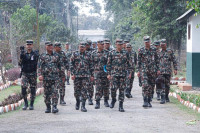National
Nepal’s lawmaking process lacks consultation
Four years of federal parliament have been disappointing for participatory lawmaking.
Binod Ghimire
The regulations of the House of Representatives and the National Assembly envision that people’s feedback could be necessary before the parliamentary endorsement of the bills. The present federal parliament has endorsed or amended over 100 Acts including some related to fundamental rights, but the public was not consulted in the process.
The lawmaking process involves three phases—pre-legislative, legislative and post-legislative—that involve policy identification and bill drafting, registration and endorsement from Parliament, and implementation of the legislation. And there has to be a proper consultation with stakeholders and deliberations among lawmakers. “However, our lawmaking process is very uninformative right from the drafting process,” Khim Lal Devkota, a member of the Upper House and an expert on federalism, told the Post. “This leads to duplicative, ambiguous, confusing, and conflicting laws.”
Devkota, who has his research article “Law-Making Processes in Federal Nepal” published in the journal of International Center for Public Policy under Andrew Young School of Policy Studies in Georgia State University, United States on Tuesday, said no one—from the government that drafts bills to the parliamentarians—is taking initiative to make the lawmaking process consultative.
In his article Devkota says the government barely consults stakeholders and parliamentarians before drafting the bills. A select group of bureaucrats and the people selected by the government prepare the draft. When the drafts are registered in parliament, even the lawmakers don’t take keen interest in the deliberations. The ruling party lawmakers are not in the habit of commenting on bills introduced by their government, according to the article.
Similarly, in many instances, the lawmakers are unaware of the parliament’s agenda until the House meetings commence. In lack of information on the agenda, parliamentarians are unprepared for discussions on the bills. “The members of the parliament will only have time for preparations if the agenda of the House is provided on time,” reads the article. “The deliberations on the bills cannot be effective without timely information.”
It also points out the reluctance of the lawmakers themselves to study the bills before voting for their endorsement.
For instance, on December 24, 2018, the government had registered a bill in the federal parliament to amend a few laws which included a proposal to revise the Nepal Trust Act. The bill proposed revision in 56 different laws which included the Nepal Trust Act in 27th number. The bill was tabled for deliberations in the House of Representatives on January 1, 2019 and was endorsed in the following February 15 without opposition. The National Assembly endorsed it on March 2 of the same year and it was authenticated by President Bidya Devi Bhandari the very next day. However, the issue came to light only when KP Sharma Oli government decided to lease out the land under the Trust to the Yeti Group. Even the lawmakers, who had voted for the revision, criticised the law though they had overlooked the issue during the discussions in the House.
Devkota claims the laws can be implemented effectively when the public are aware of the kinds of bills the government is drafting, which is done by collecting feedback from them. However, the parliament secretariat has given little attention to this aspect. “People’s feedback is taken whenever the parliament feels its necessity,” Roj Nath Pandey, spokesperson at the secretariat, told the Post. “It is true that no bill has been discussed in public since the federal parliament came into being.”
Former lawmakers and legal experts agree that the lawmaking process in Nepal is not consultative mainly because the executive is unwilling to do so. Radheshyam Adhikari, a former member of the National Assembly, said firstly the executive is unwilling to hold consultations in the pre-legislation phase and secondly when it lands in parliament, lawmakers cannot go against their respective parties’ directives.
The lawmakers are supposed to register their amendments to a bill. However, they make compromises based on their respective parties’ positions on the bill. Adhikari said it is necessary to discuss bills at least with the stakeholders. “However, consultation is a far-fetched dream at a time when the government has been preparing laws that contradict the constitution and their lawmakers are simply rubber-stamping them,” he told the Post.
In the research article, Devkota says the lack of interest seen among lawmakers to register private bills also demonstrates their indifference to the lawmaking process, their primary responsibility. Each lawmaker is free to register bills on their own, called private bills, if they feel the government has not been bringing the needed laws.
However, except the one related to legalising marijuana cultivation for export and medical use, no private bill has been registered in the federal parliament.
Sher Bahadur Tamang, then a Nepal Communist Party lawmaker and former minister for law and justice, registered the marijuana bill in March 2020, but it hasn't been discussed in parliament yet.
“Private bills should be given priority if the core responsibility of lawmakers is to make laws. However, making and unmaking of governments seems to be a major priority,” said Devkota. He claims the four years of the federal parliament have been disappointing in terms of participatory lawmaking process.
“Given the lack of cooperation between the ruling political parties and the government, the government and Parliament, parliamentarians and political parties, the past four years have not been satisfactory in terms of implementing the constitution and federalism.”




 8.26°C Kathmandu
8.26°C Kathmandu














